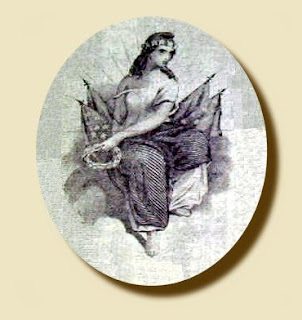nother superb example of Gary Sheaf's coloring talent. The Denver carte de visite, circa 1889-1893, that graces the cover of my book. Something my father said to me many years ago; "If you look like a crook, you can't be one." Look at those eyes and tell me this is a photograph of the old west's most infamous confidence man...
Thank you Gary Sheaf!

Gary Sheaf
April 27, 2012
April 22, 2012
APRIL 30
1789: George Washington takes office as first elected U.S. president.
1803: The U.S. purchases the Louisiana Territory from France for $15 million.
1812: Louisiana admitted as the 18th U.S. state.
1860: Navajo Indians attack Fort Defiance, New Mexico Territory, killing one and wounding two.
1861: President Lincoln orders Union troops to leave Indian Territory.
1864: Work begins on the Dams along the Red River. The work will allow Union General Nathaniel Banks' troops to sail over the rapids above Alexandria, Louisiana.
1869: Union Pacific tracks reach Promitory Point, Utah.
1871: Apache Indians are massacred at Camp Grant, Arizona Territory.
1878: In Lincoln County, New Mexico Territory members of the "Seven Rivers Crowd" encounter Frank McNab, Ab Sanders, and Frank Coe, watering their horses in a stream. McNab and Sanders are shot immediately, while Coe attempts to escape but his horse is killed and he is captured. When the men returned to the stream they saw that McNab was still alive and they shot him again, killing him. Sanders eventually recovers from his wounds.
1883: Luke Short, co-owner of the Long Branch Saloon, Dodge City, Kansas is angered when three female entertainers are arrested. Luke fires at L. C. Hartman who falls to the ground unhurt. Luke believing he has killed Hartman flees the scene.
1884: Henry Newton Brown and two others attempt to rob a bank at Medicine Lodge, Kansas. The robbery is halted in a gun battle that costs the lives of numerous towns’ people. The robbers are captured and placed in the town jail. That night vigilantes stormed the jail and drug the men from their cells. Brown was killed while trying to escape. The other two were hung. At the time of the robbery Brown was Marshal of Caldwell, Kansas.
1889: George Washington's inauguration becomes the first U.S. national holiday.
1889: Outlaw George Tobler and Irvin Richmond were vying for the affection of the same female at a dance. Tobler, apparently distressed over his prospects, produced a pistol and shot Richmond dead. He was arrested immediately and sent to Fort Smith, Cache Bottom, Choctaw Nation (Arkansas) where he was hanged on January 30, 1890.
 |
| Thank you Howard! -Jeff Smith |




































